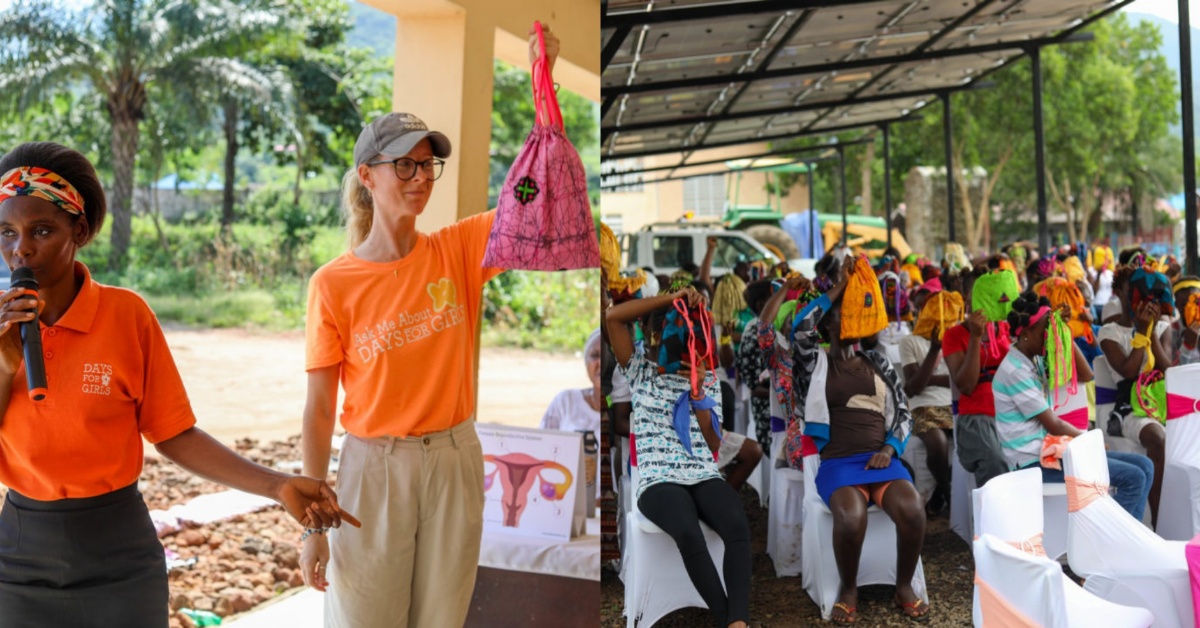Adolescent girls at Don Bosco Fambul won’t have to buy menstrual pads for the next three years. As they have received free reusable menstrual pad kits from Uman Tok organisation
Fifteen minutes is how long it takes Uman Tok tailors to make one of the seventy reusable menstrual pad kits donated to teens at Don Bosco.
The kits currently cost NLE 140 or $8 and are made at cost-recovery, but on this day, they were free thanks to a donation from Calista West.
West founded her eponymous fine jewelry brand in Nantucket, Massachusetts, in 2017. Since learning about the plight of artisanal miners and communities in Sierra Leone as a student at the Gemological Institute of America, West says she wanted to find ways to make an impact.
“Although Sierra Leone is rich in minerals like diamonds, those communities that have produced the most gems are also some of the poorest, I was disturbed by the working conditions there,” said West.
“Being an expectant mother myself, I was especially inspired to support the adolescents to meet their reproductive health needs through the provision of reusable menstrual pads.
” Each menstrual kit comes in a cotton bag and contains eight liners, two panties, two shields, two soaps, a care-and-use instruction card, and two plastic ziplock for wet and dry storage.
Since its founding in 2016, Uman Tok has been working to reduce period poverty and make sexual reproductive health education accessible to school-going boys and girls.
“We support adolescents to take care of themselves so that people will not abuse them, to get what they want, especially during their menstrual cycle,” said Mariatu Marley Yateh, Uman Tok’s Sexual and Reproductive Health Education facilitator.
Every time we donate or sell our kits, we also teach about reproductive sexual health.”
Year-round Yateh and the Uman Tok teamwork in schools across Sierra Leone, teaching children and teens about the natural changes that will happen to their bodies as they grow. Between 2020-2021, Yateh and the Uman Tok team helped 1600 boys and girls learn about their bodies. Over 19,000 Sierra Leonean girls and women received reusable kits.
“On the surface, disposable pads are cheaper, but in the long run, they’re not. Our pads are long-lasting, provide a livelihood to the women who make them and are made from biodegradable materials. Hence, they’re better for the environment,” said Kimberley Burn, a volunteer and program manager from Schools for Salone.
It was research done by Schools for Salone some six years ago about the retention of girls in schools that led to Uman Tok.
“We learned that girls at our schools were missing school days because of period poverty, so I worked with Schools for Salone to create Uman Tok, a project under Programme for Children, to meet the unmet need for menstrual hygiene in our schools.
Now we work with partner NGOs and private donors like Calista West to provide sexual and reproductive health education with the Days for Girls kits,” said Juliet Rhoman, Executive Director of Uman Tok.
Before the reusable Uman Tok menstrual kits donation to Don Bosco, teens got their pads from the orphanage.
“The girls used disposable menstrual pads that we buy for them, but they are expensive.
They can wash and reuse the kits donated by Uman Tok. That’s very helpful to the girls,” said Finda Ngewoh-Tana, a social worker at Don Bosco.
Uman Tok says it plans to continue to find partnerships that will allow them to reach more teens in Sierra Leone with sexual and reproductive health education and to donate reusable kits to vulnerable girls and women











